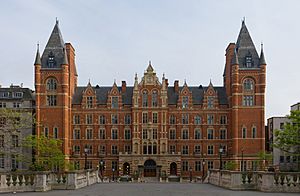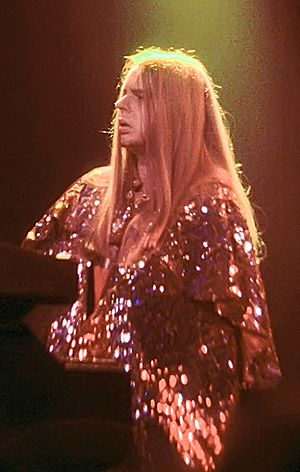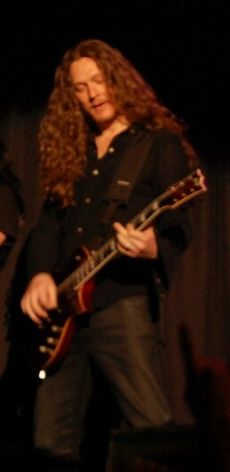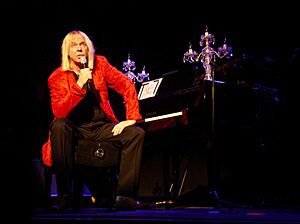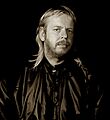Rick Wakeman facts for kids
Quick facts for kids
Rick Wakeman
|
|
|---|---|
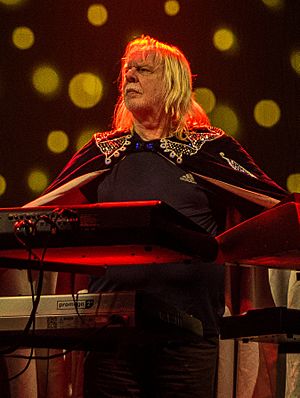
Wakeman performing in 2017
|
|
| Born |
Richard Christopher Wakeman
18 May 1949 |
| Occupation |
|
| Years active | 1969–present |
| Spouse(s) |
Rosaline Woolford
(m. 1970; div. 1977)Danielle Corminboeuf
(m. 1980; div. 1980)Nina Carter
(m. 1984; div. 2004)Rachel Kaufman
(m. 2011) |
| Children | 6, including Oliver and Adam |
| Musical career | |
| Genres |
|
| Instruments |
|
| Labels |
|
Richard Christopher Wakeman (born 18 May 1949) is an English keyboard player and composer. He is famous for being a member of the progressive rock band Yes and for his successful solo career. Wakeman is known for his amazing keyboard skills and for creating spectacular live shows.
Born in West London, Wakeman studied at the Royal College of Music but left in 1969 to become a full-time musician. He played on famous songs like "Space Oddity" for David Bowie and also worked with artists like Elton John and Cat Stevens. In 1970, he joined the rock group the Strawbs, where his talent got a lot of attention.
He joined Yes in 1971 and helped create some of their most famous albums. At the same time, he started his solo career. His most popular solo albums were The Six Wives of Henry VIII (1973), Journey to the Centre of the Earth (1974), and The Myths and Legends of King Arthur and the Knights of the Round Table (1975). These are all concept albums, which means they tell a story through music.
Over his long career, Wakeman has released over 100 solo albums in many different styles, from rock to classical to Christian music. He is also known for appearing on TV shows like Grumpy Old Men and Countdown. In 2017, he was welcomed into the Rock and Roll Hall of Fame as a member of Yes.
Contents
Early Life and Musical Beginnings
Richard Christopher Wakeman was born in Perivale, Middlesex, on 18 May 1949. He was the only child of Cyril and Mildred Wakeman. His father was a director at a building supply company and also played piano in a big band.
Wakeman started piano lessons at age seven. His teacher, Dorothy Symes, said he was a fun student but didn't always practice enough. Still, he won many awards in music competitions around London. When he was a teenager, he learned to play the church organ.
In 1963, at age fourteen, Wakeman joined his first serious band, a blues group called the Atlantic Blues. He later formed other bands to play at local events, using the money he earned to buy his first electronic keyboard.
In 1968, Wakeman won a scholarship to the Royal College of Music in London. He planned to become a concert pianist. However, he soon started spending more time playing as a session musician for other artists. This work paid well, so after a year, he decided to leave college to become a full-time musician.
Career
1969–1971: Session Work and Joining Yes
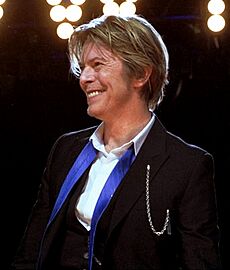
As a session musician, Wakeman played on about 2,000 recordings. One of his first big jobs was playing the Mellotron on David Bowie's song "Space Oddity". He also played piano on other Bowie songs like "Life on Mars?" and "Changes". He later said he learned a lot about working in a studio from Bowie.
In 1970, Wakeman joined the folk-rock band the Strawbs. A live album called Just a Collection of Antiques and Curios featured his amazing keyboard solos and made him famous. A popular music magazine called him "tomorrow's superstar."
In 1971, Wakeman had a big decision to make. David Bowie asked him to join his new band, the Spiders from Mars. On the same day, the band Yes asked him to join them. After rehearsing with Yes, he felt their music was a better fit for him. He joined Yes, and his career took off.
1971–1974: Fame with Yes and Solo Albums
Wakeman's first album with Yes was Fragile (1971). It was a huge success in both the UK and the US. The album included the hit song "Roundabout". The success of the album allowed Wakeman to buy more keyboards and even start a collection of cars.
The next Yes album, Close to the Edge (1972), is considered one of the greatest progressive rock albums ever made. During the tour for this album, Wakeman started wearing his famous capes on stage. A fan gave him one, and he liked it so much he had his own made, including one covered in shiny sequins.
In 1973, Wakeman released his first solo album, The Six Wives of Henry VIII. It was an instrumental album where each song was a musical interpretation of one of King Henry VIII's wives. The album was a surprise hit.
The next Yes album, Tales from Topographic Oceans, was a double album with very long and complex songs. Wakeman did not enjoy making it and felt the music was too experimental. He decided to leave the band after the tour.
On the same day he left Yes, he found out his new solo album, Journey to the Centre of the Earth, had reached number one in the UK charts. Based on the novel by Jules Verne, the album was recorded live with a full orchestra and choir. It sold over 14 million copies worldwide.
1974–1980: More Solo Success and Return to Yes
After a health scare from overworking, Wakeman wrote his next album, The Myths and Legends of King Arthur and the Knights of the Round Table. This album was about the stories of King Arthur.

To promote the album, he put on a huge show at Wembley Arena in 1975. The show was an ice pageant, with 14 ice skaters performing while Wakeman and his band played on a stage decorated like a castle. The shows were a massive success.
In 1976, Wakeman rejoined Yes. He felt their new music was more direct and enjoyable. He played on the album Going for the One (1977), which he considered one of the band's best. He stayed with Yes for the album Tormato (1978) before leaving the group again in 1980.
1980–1997: New Projects and More Yes Reunions
In the 1980s, Wakeman explored different kinds of music. He released the album 1984, based on George Orwell's famous novel. He also began making new-age and Christian music. His solo piano album Country Airs (1986) was very popular.
In 1988, he formed the group Anderson Bruford Wakeman Howe with other former members of Yes. They released one album and toured together. This led to Wakeman rejoining Yes for a third time for the Union album and tour in 1991.
Throughout the 1990s, Wakeman continued to release solo albums and tour. He often performed with his son, Adam Wakeman, who is also a keyboard player. In 1995, he rejoined Yes for a fourth time, recording two albums with the "classic" lineup before leaving again in 1997.
1998–Present: Recent Career
In 1999, Wakeman released Return to the Centre of the Earth, a sequel to his famous 1974 album. It featured the London Symphony Orchestra and guest stars like Ozzy Osbourne and Bonnie Tyler.
Wakeman rejoined Yes for a fifth and final time from 2002 to 2004. He toured the world with them for their 35th anniversary. After leaving, he focused on his solo career and other projects.
In 2009, he performed The Six Wives of Henry VIII live at Hampton Court Palace to celebrate the 500th anniversary of King Henry VIII's accession to the throne. He also re-recorded and expanded both Journey to the Centre of the Earth and King Arthur for special live performances.
From 2016 to 2018, he toured with fellow Yes members Jon Anderson and Trevor Rabin under the name Yes Featuring Jon Anderson, Trevor Rabin, Rick Wakeman.
In recent years, Wakeman has released a series of successful solo piano albums, including Piano Portraits (2017) and Piano Odyssey (2018). He continues to tour, performing his classic albums and solo piano shows for audiences around the world.
Personal Life
Wakeman has been married four times and has six children. Two of his sons, Oliver and Adam, are also professional keyboard players and have worked with him on various projects.
He is a big fan of football and has supported Brentford F.C. his whole life. He was even a director of the club for a year in 1979. He also supports Manchester City F.C.
Wakeman is known for his sense of humor and his skills as a storyteller, which he often shows during his live concerts and on television appearances. In 2021, he was appointed a Commander of the Order of the British Empire (CBE) for his services to music and broadcasting.
Images for kids
-
Wakeman performing at the Royal Albert Hall in 2009
See also
 In Spanish: Rick Wakeman para niños
In Spanish: Rick Wakeman para niños
 | Roy Wilkins |
 | John Lewis |
 | Linda Carol Brown |


